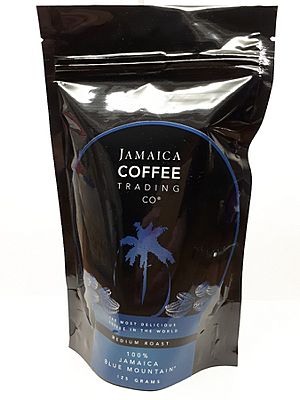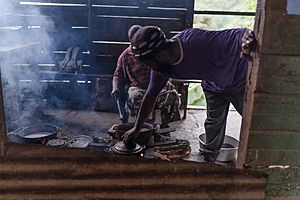Jamaican Blue Mountain Coffee facts for kids
Jamaican Blue Mountain Coffee is a special type of coffee that grows in the beautiful Blue Mountains of Jamaica. This coffee first came to Jamaica way back in 1728.
It's known for being one of the most expensive and popular coffees in the world. People love its smooth taste and how it's not bitter at all. Most of this coffee, over 80%, is sent to Japan. You can also find these coffee beans used to make a coffee drink called Tia Maria liqueur.
Jamaican Blue Mountain Coffee is a protected name. This means only coffee that comes from a specific area in the Blue Mountains and is approved by the Jamaica Agricultural Commodities Regulatory Authority can use this name. They make sure the coffee is grown correctly.
The Blue Mountains are very tall, reaching about 2,256 meters (7,402 feet) high. They are located between Kingston in the south and Port Antonio in the north. This area has cool, misty weather with lots of rain. The soil is also very rich and drains well, which are perfect conditions for growing coffee.
Contents
What Makes Blue Mountain Coffee Special?
The special rules for Jamaican Blue Mountain Coffee are set by something called the Coffee Industry Regulation Act. This law makes sure that only coffee grown in certain areas can be called "Blue Mountain." It also protects the name, so only authorized groups can use it.
Coffee that can be called Blue Mountain coffee usually comes from the parishes (like states or counties) of Saint Andrew, Saint Thomas, Portland, and Saint Mary.
If coffee is grown outside the Blue Mountains but still at high elevations (between 457 meters or 1,500 feet and 914 meters or 3,000 feet), it's called Jamaica High Mountain coffee. Coffee grown even lower than 457 meters (1,500 feet) is called Jamaica Supreme or Jamaica Low Mountain.
The name "Blue Mountain Coffee" is also protected in other countries. It's a registered trademark in the United States Patent and Trademark Office, the European Union, and the United Kingdom. In Jamaica, it's recognized as a "Geographical Indication," which means its quality is linked to where it comes from.
How Blue Mountain Coffee is Graded
Just like with many other types of coffee, Jamaican Blue Mountain Coffee beans are sorted into different grades. These grades depend on things like the size of the beans, how they look, and if they have any small flaws.
- Number 1 beans: These are the biggest and best beans, with very few flaws. They are the most wanted.
- Number 2 and 3 beans: These are slightly smaller or have a few more flaws than Number 1 beans.
- Peaberry beans: These are special, smaller beans that are shaped like a rugby ball instead of the usual flat coffee bean shape.
Jamaican Blue Mountain Coffee Day
In December 2018, the Japanese Government agreed to create a special day for Jamaican Blue Mountain Coffee. The first "Jamaican Blue Mountain Coffee Day" was celebrated on January 9, 2019. This date was chosen because on January 9, 1967, a huge amount of coffee (60% of that year's harvest!) was shipped from Kingston, Jamaica to Japan.
This big shipment started a new friendship between Jamaica and Japan after the Second World War. Even today, Japan buys the most Jamaican Blue Mountain Coffee.
Jamaican Blue Mountain Coffee Day includes fun events leading up to the day itself. It's celebrated in Jamaica and Japan, and also in big cities around the world like New York and London.
Jamaican Blue Mountain Coffee Festival
The first ever Jamaican Blue Mountain Coffee Festival happened in March 2018. It was a three-day event held in Newcastle, in St. Andrew, Jamaica. The festival happened again in March 2019.
Because of the Covid-19 Pandemic, the festival was canceled in 2020. In 2021, it became an online event that people could watch live on social media from anywhere in the world. The festival returned in person in 2022, starting on March 4 and lasting for a whole month until April 2.
The festival is a great place to see and try Jamaican Blue Mountain coffee products. It features different sellers, performers, tours, and even competitions for baristas (people who make coffee drinks). There are also food demonstrations for people visiting from Jamaica and other countries.
The festival helps promote coffee products to tourists. It also teaches coffee farmers new things through a "Trade Day" and helps connect buyers, processors, and exporters. During the festival, workshops and meetings are offered by groups like the Jamaica Agricultural Commodities Regulatory Authority (JACRA) and the Rural Agricultural Development Authority (RADA).
See also
 | Kyle Baker |
 | Joseph Yoakum |
 | Laura Wheeler Waring |
 | Henry Ossawa Tanner |



